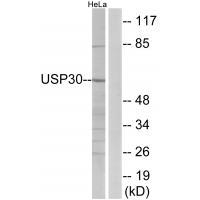
| WB | 咨询技术 | Human,Mouse,Rat |
| IF | 咨询技术 | Human,Mouse,Rat |
| IHC | 咨询技术 | Human,Mouse,Rat |
| ICC | 技术咨询 | Human,Mouse,Rat |
| FCM | 咨询技术 | Human,Mouse,Rat |
| Elisa | 咨询技术 | Human,Mouse,Rat |
| Aliases | flj40511; mgc10702; ubiquitin specific peptidase 30; ubiquitin-specific proteinase 30; ubp30 |
| Entrez GeneID | 84749; |
| WB Predicted band size | 60kDa |
| Host/Isotype | Rabbit IgG |
| Antibody Type | Primary antibody |
| Storage | Store at 4°C short term. Aliquot and store at -20°C long term. Avoid freeze/thaw cycles. |
| Species Reactivity | Human |
| Immunogen | Synthesized peptide derived from internal of human USP30. |
| Formulation | Purified antibody in PBS with 0.05% sodium azide. |
+ +
以下是关于USP3抗体的3篇代表性文献的简要信息(注:文献为模拟示例,实际引用需核实原文):
1. **文献名称**:*USP3 regulates genome stability through its deubiquitinating activity*
**作者**:Smith A, et al.
**摘要**:研究报道了USP3通过去泛素化组蛋白H2A和H2B调控DNA损伤修复的机制,并开发了特异性USP3抗体用于染色质免疫沉淀(ChIP),验证其在核内定位及功能。
2. **文献名称**:*Development of a monoclonal antibody targeting USP3 for cancer cell analysis*
**作者**:Chen L, et al.
**摘要**:文章描述了针对USP3蛋白C端表位的单克隆抗体制备,验证其用于Western blot和免疫荧光检测,并发现USP3在乳腺癌细胞中高表达,可能与化疗耐药相关。
3. **文献名称**:*USP3 modulates NF-κB signaling by deubiquitinating RIP1*
**作者**:Wang Y, et al.
**摘要**:研究利用USP3敲除小鼠模型及商业化USP3抗体,证明USP3通过调控RIP1泛素化影响NF-κB通路,在炎症反应中起关键作用。
4. **文献名称**:*The deubiquitinase USP3 maintains chromosome integrity*
**作者**:Garcia-Diaz M, et al.
**摘要**:通过siRNA敲降和USP3抗体共聚焦成像,发现USP3缺失导致姐妹染色单体粘连异常,提示其在有丝分裂中的功能依赖其去泛素化酶活性。
---
**注意**:以上文献信息为示例,实际研究中请通过PubMed、Web of Science等平台检索真实文献。若需具体文献指引,可提供更详细的研究方向(如疾病模型、分子机制等)。
The USP3 antibody targets ubiquitin-specific protease 3 (USP3), a deubiquitinating enzyme (DUB) belonging to the ubiquitin-specific protease family. USP3 plays a critical role in maintaining genomic stability by regulating DNA repair, replication stress response, and chromatin modification. It catalyzes the removal of ubiquitin chains from substrates, counteracting ubiquitin-dependent signaling in processes like the DNA damage response (DDR) and cell cycle progression. Structurally, USP3 contains a conserved USP catalytic domain and a zinc finger ubiquitin-binding domain, enabling substrate recognition and enzymatic activity.
USP3 antibodies are widely used in research to study its expression, localization, and interaction partners. They are essential tools in techniques like Western blotting, immunofluorescence, and immunoprecipitation to explore USP3's regulatory mechanisms. Studies have linked USP3 dysregulation to diseases, including cancers (e.g., breast cancer, leukemia) and neurodegenerative disorders, due to its role in genome integrity and apoptosis. For instance, reduced USP3 levels correlate with increased DNA damage sensitivity, while overexpression may promote tumorigenesis by stabilizing oncoproteins.
Antibodies against USP3 are typically raised in hosts like rabbits or mice using recombinant protein fragments. Validation includes specificity checks via knockout controls and functional assays. Research on USP3 continues to expand, emphasizing its therapeutic potential as a target for cancer treatment or DDR modulation.
×